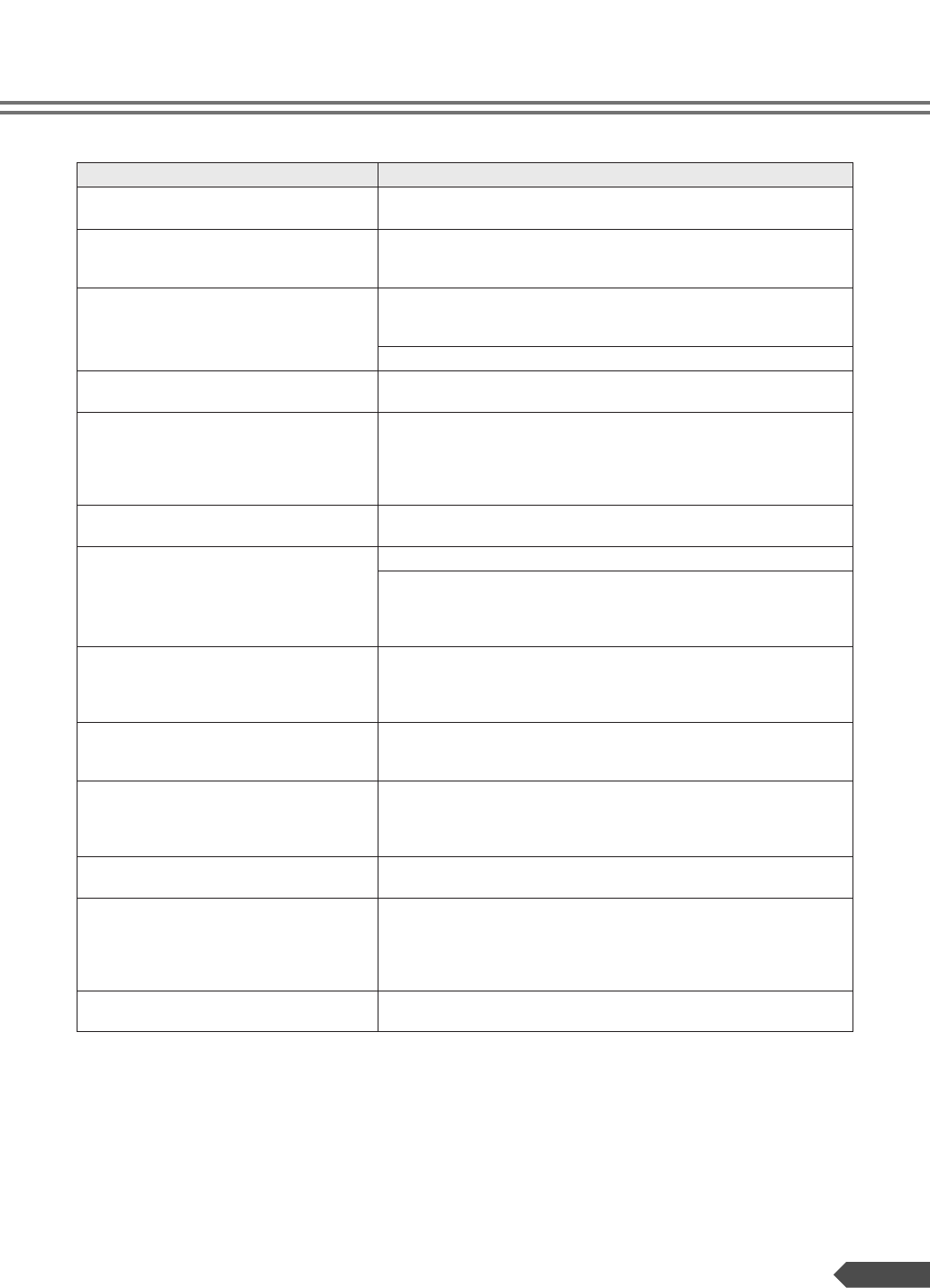
PSR-E203/YPT-200 Owner’s Manual 61
Troubleshooting
Problem Possible Cause and Solution
When the instrument is turned on or off, a
popping sound is temporarily produced.
This is normal and indicates that the instrument is receiving electrical
power.
When using a mobile phone, noise is pro-
duced.
Using a mobile phone in close proximity to the instrument may produce
interference. To prevent this, turn off the mobile phone or use it further
away from the instrument.
There is no sound even when the keyboard is
played or when a Song or Style is being
played back.
Check that nothing is connected to the PHONES/OUTPUT jack on the
rear panel. When a set of headphones is plugged into this jack, no sound
is output.
Check the Local Control on/off. (See page 52.)
Playing keys in the right hand area of the
keyboard does not produce any sound.
When using the Dictionary function (page 46), the keys in the right hand
area are used only for entering the chord root and type.
• The volume is too soft.
• The sound quality is poor.
• The rhythm stops unexpectedly or will not
play.
• The Song, etc. does not play correctly.
The batteries are low or dead. Replace all six batteries with completely
new ones, or use the optional AC adaptor.
The Style or Song does not play back when
the [START/STOP] button is pressed.
Is External Clock set to ON? Make sure External Clock is set to OFF;
refer to “External Clock Settings” on page 52.
The Style does not sound properly.
Make sure that the Style Volume (page 43) is set to an appropriate level.
Is the Split Point set at an appropriate key for the cords you are playing?
Set the Split Point at an appropriate key (page 36).
Is the “ACMP ON” indicator showing in the display? If it is not showing
press the [ACMP ON/OFF] button so that it does show.
No rhythm accompaniment plays when the
[START/STOP] button is pressed after
selecting Style number 093-100 (Pianist).
This is not a malfunction. Style number 093-100 (Pianist) have no
rhythm parts, so no rhythm will play. The other parts will begin playing
when you play a chord in the accompaniment range of the keyboard if
auto accompaniment is turned on.
Not all of the voices seem to sound, or the
sound seems to be cut off.
The instrument is polyphonic up to a maximum of 32 notes. If a style or
Song is playing back at the same time, some notes/sounds may be omit-
ted (or “stolen”) from the accompaniment or Song.
The footswitch (for sustain) seems to pro-
duce the opposite effect. For example, press-
ing the footswitch cuts off the sound and
releasing it sustains the sounds.
The polarity of the footswitch is reversed. Make sure that the footswitch
plug is properly connected to the SUSTAIN jack before turning on the
power.
The ACMP ON indicator does not appear
when the [ACMP ON/OFF] button is pressed.
Always press the [STYLE] button first when you are going to use any
style-related function.
The part indications, such as Right, Left and
Both Hands, do not appear—even when
pressing the [R] or [L] buttons for the Lesson.
Make sure that you are not pressing the [R] or [L] buttons while the Song
is playing. If you press one of the part buttons while playing the Song
and before starting the Lesson, these buttons serve to mute the corre-
sponding Song tracks. Stop the Song first, then select the desired part
and start the Lesson.
Regardless of how strongly play the keys, the
level of the sound does not change.
Since this keyboard does not have touch response, the level of the
sound does not change in response to your playing strength.


















